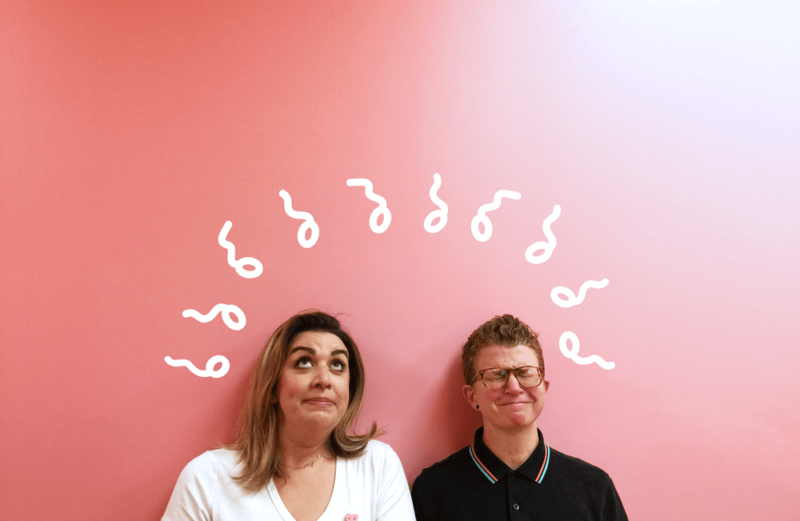
Source: Cristal Veronica Photos
Reproductive technologies now allow for greater options for family building, not only for people who experience infertility but also for same-sex couples. Reciprocal IVF is one way for women to choose to start a family together. Reciprocal IVF (also known as partner IVF) is an option for lesbian couples where both partners can be physically involved in the conception of their child; one partner contributes the egg and the other partner carries the pregnancy.
We were fortunate to connect with Karyne and Kate who are documenting their experience with reciprocal IVF through their podcast The Gayest Show On Birth.
FS: Tell us about a bit about reciprocal IVF and how it became your method of family building.
K&K We always knew that we wanted a family, even before we got together. And we wanted to try to have our own family, with our own genetics. Further, Karyne knew that she didn't want to carry the baby. But Kate offered up that we could do reciprocal IVF. We decided to try it that way first because Karyne is nearing 40, and this might be the last shot to get some good eggs!
FS: What about finding the right reciprocal IVF service provider. What are key qualities that you'd recommend looking for?
K&K We went through the Glow Fertility Program, which offers a discount on IVF treatments. We figured that anyone that they partnered with would be a good recommendation. We are lucky to have a few IVF clinics in the Bay Area we could go to (including one by our house), but we decided we'd give the one that Glow partnered with a shot. We had a fantastic experience at the clinic we chose, from the moment we walked in the door. Our clinic has friendly employees, quick responses, and good success rates. We decided that success rates of the clinic weren't as important to us as friendly and knowledgeable staff. We didn't expect to have any fertility issues, and many of the numbers that are available are for people who have actual problems conceiving. We didn't feel like we fit into that category.
FS: Both partners have a physical role in the process with reciprocal IVF. How did you decide which role works best for which partner?
K&K Karyne has always known that she didn't want to carry, but was OK with not being genetically related to the child. When Kate suggested doing reciprocal IVF for the first try, Karyne was over the moon. That way both of us would have an extra strong physiological bond to the baby.
FS: Selecting a sperm donor feels like it could be an overwhelming task. Can you describe the process you went through to decide on a donor?
K&K We always say that choosing a sperm donor is a little like online dating: you're not offered a lot of information, and you just sort of have to go with your gut. The easiest thing for us was to narrow it down to one sperm bank and stick with that one. The one we chose is very small (located in Berkeley, California), and has very strict regulations when it comes to how many births can come from each donor. It's crazy that there are no federal (or even state!) standards when it comes to sperm donors; there's not even a federal registry of sperm donors, so theoretically, the same guy could donate at several different banks and have tons of kids!
So once we narrowed it down to the sperm bank we were going with, we made a spreadsheet to compare the few donors we were interested in. Because it would be Karyne's genetics, we tried to choose someone who kind of looks like Kate. And one we really felt connected to (from the profile provided).
FS: What has been the biggest surprise you have encountered with your reciprocal IVF experience so far?
K&K We're constantly surprised by how little information there is out there for reciprocal IVF. Even our clinic had a little trouble when it came to billing us (since we're splitting up the IVF process between the two of us). But that's one of the reasons we wanted to start the Gayest Show on Birth podcast; so we could offer some information to other people who are going through the same IVF process as we are!
FS: What would you want people who are not familiar with same-sex family building to know about reciprocal IVF?
K&K Reciprocal IVF is when you use one partner's egg, the other partner's uterus. There are many paths to making a family, and this is one that works for us!
FS: What would you want other individuals who may be interested in undergoing reciprocal IVF to know?
K&K Splitting up the work bringing this baby into the world has been kind of a blessing. There are a lot of moving parts, and both of us being able to have a hand in everything (from self-injecting hormones to numerous doctor appointments) has brought us closer together, and really makes it feel like we're building something together. Although both parents are 100% involved in bringing a child into the world, no matter how that child is brought into the world, reciprocal IVF has allowed us to feel more connected to the process. It's really crazy what modern medicine can do.
FS: Are there any great resources on reciprocal IVF that you'd recommend?
K&K Not many! We belong to a few LGBTQ* Facebook groups for same-sex couples trying to conceive, and we've found that many people in those groups are doing regular IVF or IUI (insemination). But again, that's why we're hoping that Gayest Show on Birth can answer some questions for people who are looking to doing reciprocal IVF (and even for people who aren't going through any kind of IVF!).